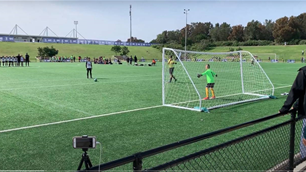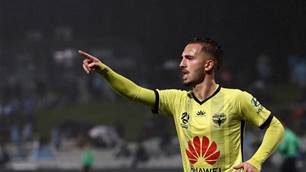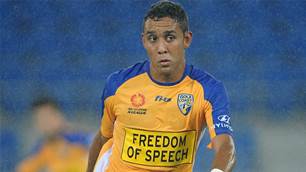ANALYSIS: By his own admission, Glory striker Nikita Rukavytsya has struggled to recapture the form he showed after exploding onto the A-League scene last term.
His second-half strike against Adelaide on Sunday was only his third of the campaign, yet speculation continues to grow that the 21-year-old is poised to secure a lucrative move to a European club early next year.
How much truth lurks amid that speculation is open to debate, but what does appear undeniable is that Rukavytsya, in pure footballing terms, is not yet ready for such a move.
The Ukrainian-born youngster’s potential has been hard to miss since he was drafted in on a short-term replacement deal during the 2006/2007 season. His searing pace is his most formidable quality.
He is one of those rare breed of players who does not need even half-a-metre to beat a defender to the ball. Like Michael Owen in his prime, Rukavytsya is capable of leaving his marker for dead in the blink of an eye, as the likes of Ange Costanzo and Tony Popovic have found out to their cost.
His finishing prowess is by no means Owen-esque, but he does have plenty of power and precision in his left foot and needs no second invitation to shoot.
Six goals last term was an impressive return for a raw youngster playing his first full season of professional football in a struggling side and he quickly established himself as a rising star.
The fact that he has not managed to retain that rapid ascendancy rate so far this season is not to suggest that he has flattered to deceive, however. It is simply an indication that for all his raw talent, Rukavytsya has some way to go before he will be equipped to successfully meet the challenges thrown up by European football.
Firstly, he urgently needs to improve his right foot. At the moment, it is used for little more than standing on, a fact that has not been lost on Rukavytsya’s opponents this season.
Clued-up defenders are now starting to simply show the young striker onto his weaker foot, knowing that he will have to check back and can then be closed down and forced to pass or be easily dispossessed.
He also needs to improve his work off the ball. Strike partners Jamie Harnwell and Eugene Dadi are both renowned for their aerial abilities and therefore Rukavytsya can safely assume that more often than not, flick-ons and nod-downs will be heading in his direction.
In short, he needs to play much closer to the target man, whoever he may be and be much more willing to gamble on his attacking colleague winning the fifty-fifty ball.
With his electrifying pace, he can afford not to have to play on the shoulder of the last defender and thereby run the risk of straying off-side, but can lurk deeper and still latch onto the service provided by Harnwell or Dadi.
It is perhaps unrealistic to expect Rukavytsya to become as adept in the air as either of his two attacking colleagues, but he can undoubtedly improve in that area as well.
He could certainly take a leaf out of Harnwell’s book in terms of sheer courage and a willingness to go in where it hurts. Top strikers have a desperation to get on the end of crosses and through balls even when the boots are flying and defenders and goalkeepers are throwing themselves into the challenge.
Rukavytsya’s relatively lightweight physique means that he cannot be expected to become a bruising, crash-bang centre-forward of yesteryear, but he has to be tough enough to focus solely on putting the ball in the back of the net even if it means being clattered in the process.
With all due respect to the A-League, better defenders overseas are quicker to identify strengths and weaknesses in their opponents, as Rukavytsya’s fellow-Olyroo Bruce Djite is presently discovering at Turkish outfit Genclerbirligi.
Djite is of course more renowned for his strength than his pace and he will need to live up to that reputation if he is to successfully survive the attentions of his markers in one of Europe’s more uncompromisingly physical leagues.
n current evidence, it seems unlikely that Rukavytsya would presently be able to adapt to such a rugged on-field environment.
It can also be argued that another season in the A-League would not only improve Rukavytsya as a player, but also enhance his chances of moving to a respected European club, rather than a more obscure outfit plying their trade in one of the continent’s backwater divisions.
With all due respect to countries such as Romania or Hungary, their domestic championships are generally poorly funded, badly administered and enjoy very little in the way of profile abroad.
Some may argue that they would provide Rukavytsya with a stepping stone to one of Europe’s higher quality competitions, but given Australia’s rapidly increasing international reputation, he would almost certainly be just as well served by staying in the A-League.
For now, Rukavytsya simply needs to build on the confidence that should be flowing again following his goal against Adelaide.
The fact that he played on during that game despite receiving several staples in the back of his head and sustaining a hefty blow to his hip, indicates that he may already be beginning to develop the level of physical toughness that he will need in order to maximise his undoubted natural talents.
There is no doubt that Rukavytsya can play a key role in reviving Glory’s flagging fortunes and in doing so, can greatly further his own personal ambitions.
If he can ignore the speculation, work on his weaknesses and listen to the right advice, a very bright future beckons.
And in the short-term, at least, that future would be best spent in the West.
How much truth lurks amid that speculation is open to debate, but what does appear undeniable is that Rukavytsya, in pure footballing terms, is not yet ready for such a move.
The Ukrainian-born youngster’s potential has been hard to miss since he was drafted in on a short-term replacement deal during the 2006/2007 season. His searing pace is his most formidable quality.
He is one of those rare breed of players who does not need even half-a-metre to beat a defender to the ball. Like Michael Owen in his prime, Rukavytsya is capable of leaving his marker for dead in the blink of an eye, as the likes of Ange Costanzo and Tony Popovic have found out to their cost.
His finishing prowess is by no means Owen-esque, but he does have plenty of power and precision in his left foot and needs no second invitation to shoot.
Six goals last term was an impressive return for a raw youngster playing his first full season of professional football in a struggling side and he quickly established himself as a rising star.
The fact that he has not managed to retain that rapid ascendancy rate so far this season is not to suggest that he has flattered to deceive, however. It is simply an indication that for all his raw talent, Rukavytsya has some way to go before he will be equipped to successfully meet the challenges thrown up by European football.
Firstly, he urgently needs to improve his right foot. At the moment, it is used for little more than standing on, a fact that has not been lost on Rukavytsya’s opponents this season.
Clued-up defenders are now starting to simply show the young striker onto his weaker foot, knowing that he will have to check back and can then be closed down and forced to pass or be easily dispossessed.
He also needs to improve his work off the ball. Strike partners Jamie Harnwell and Eugene Dadi are both renowned for their aerial abilities and therefore Rukavytsya can safely assume that more often than not, flick-ons and nod-downs will be heading in his direction.
In short, he needs to play much closer to the target man, whoever he may be and be much more willing to gamble on his attacking colleague winning the fifty-fifty ball.
With his electrifying pace, he can afford not to have to play on the shoulder of the last defender and thereby run the risk of straying off-side, but can lurk deeper and still latch onto the service provided by Harnwell or Dadi.
It is perhaps unrealistic to expect Rukavytsya to become as adept in the air as either of his two attacking colleagues, but he can undoubtedly improve in that area as well.
He could certainly take a leaf out of Harnwell’s book in terms of sheer courage and a willingness to go in where it hurts. Top strikers have a desperation to get on the end of crosses and through balls even when the boots are flying and defenders and goalkeepers are throwing themselves into the challenge.
Rukavytsya’s relatively lightweight physique means that he cannot be expected to become a bruising, crash-bang centre-forward of yesteryear, but he has to be tough enough to focus solely on putting the ball in the back of the net even if it means being clattered in the process.
With all due respect to the A-League, better defenders overseas are quicker to identify strengths and weaknesses in their opponents, as Rukavytsya’s fellow-Olyroo Bruce Djite is presently discovering at Turkish outfit Genclerbirligi.
Djite is of course more renowned for his strength than his pace and he will need to live up to that reputation if he is to successfully survive the attentions of his markers in one of Europe’s more uncompromisingly physical leagues.
n current evidence, it seems unlikely that Rukavytsya would presently be able to adapt to such a rugged on-field environment.
It can also be argued that another season in the A-League would not only improve Rukavytsya as a player, but also enhance his chances of moving to a respected European club, rather than a more obscure outfit plying their trade in one of the continent’s backwater divisions.
With all due respect to countries such as Romania or Hungary, their domestic championships are generally poorly funded, badly administered and enjoy very little in the way of profile abroad.
Some may argue that they would provide Rukavytsya with a stepping stone to one of Europe’s higher quality competitions, but given Australia’s rapidly increasing international reputation, he would almost certainly be just as well served by staying in the A-League.
For now, Rukavytsya simply needs to build on the confidence that should be flowing again following his goal against Adelaide.
The fact that he played on during that game despite receiving several staples in the back of his head and sustaining a hefty blow to his hip, indicates that he may already be beginning to develop the level of physical toughness that he will need in order to maximise his undoubted natural talents.
There is no doubt that Rukavytsya can play a key role in reviving Glory’s flagging fortunes and in doing so, can greatly further his own personal ambitions.
If he can ignore the speculation, work on his weaknesses and listen to the right advice, a very bright future beckons.
And in the short-term, at least, that future would be best spent in the West.
Related Articles

Fresh talent flock to ambitious A-League outfit's pro pathway

Why A-League 20/21 is crucial for Olyroos’ medal hopes













